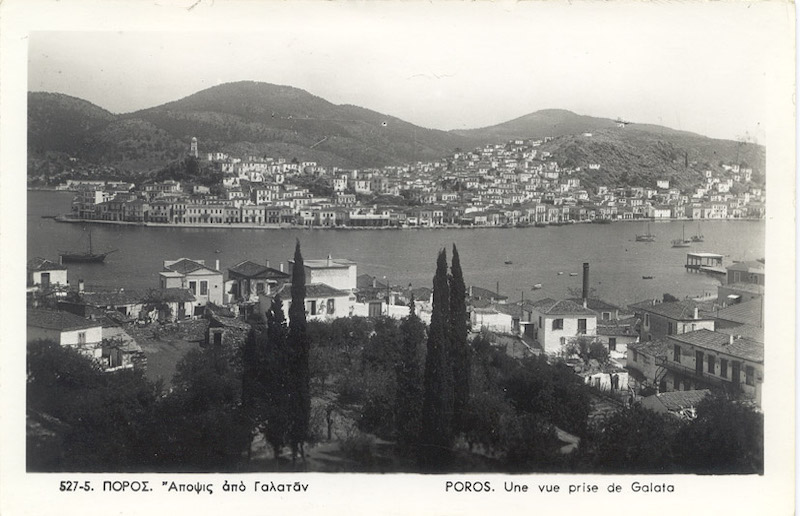TRANSLATOR’S NOTE
Don Schofield on Liana Sakelliou’s “With a View of the Sea”
My primary challenge in rendering Liana Sakelliou’s poems into English has been how to bring their rich, densely detailed world to life for the anglophone reader. I also wanted to make the milieu conveyed by her work as immediate in English as it is in Greek. Since there is considerable foreignness already in the world that Sakelliou’s poems inhabit, I strove to make the translated versions as target-language friendly as possible. In poems packed with mythological, historical, geographical, cultural and environmental particulars, all easily familiar to Greek readers, I had to keep asking myself how to convey these details without sending the reader to page after page of notes at the back of the book, not an easy task since most anglophone readers of poetry don’t know, for example, many details about the Nazi Occupation of Greece or the overthrow of the government by a military junta in 1967, though virtually every Greek does. How many anglophone readers are familiar with the rites connected to Greek Orthodoxy, or with the biographical details of historical figures like Ioannis Kapodistrias and Demosthenes? Many English-speaking readers know about Aphrodite, Poseidon, Dionysus and other deities from classical mythology, but few know about the ancient rites connected to them.
The same applies to poems that relate various aspects of commerce (such as the international trade in lemons grown on the island of Poros), farming and fishing as islanders do them, or what spoon-sweets are. In a poem where concrete details are paramount, conveying these specifics clearly and with the immediacy intended by the poet sometimes required various kinds of intervention on my part (always in collaboration with the poet). I worked closely with Sakelliou, not only to bring across the history, mythology, genealogy and geography associated with Poros, but also to provide a clear, relatable context for her poems as they build, one upon the other, and interact back and forth throughout the book.

Those were the challenges. The main reward has been, to say it most simply, the pleasure of translating itself, of seeing “With a View of the Sea” in English. That pleasure includes all that was gained in the dialogue between poet and translator as we articulated and deepened our understanding of the poem. Making images, phrasing, diction and other elements work for the target audience; getting the flow from stanza to stanza right. These were challenges in all of Sakelliou’s poems, but in this particular poem the central challenge was clearly expressing the frequently shifting points of view and the various personas they represent; assessing the nuances of tone, draft to draft. All these required hour after hour of intense discussions that, in the end, improved my ability to deploy the elements of my own language in the service of translation, and, more importantly, enabled me to appreciate Sakelliou’s profound vision of place—“the smallest of places”—and the lives that bind her to that place, especially when a sweet breeze blows.
Let me conclude with a few words to help the reader navigate this long,
multi-voiced poem. As I mention above, in Ms. Sakelliou’s Greek, there is
very little direct indication of who is speaking, from poem to poem as well
as in individual poems with more than one speaker. For Greek readers, who
understand the context behind the poems, such signposts aren’t completely
necessary. Not so for anglophone readers. What the poet and I agreed to do,
at least in “With a View of the Sea,” was to demarcate the three different
voices at work in the narration as follows: regular typeface is used for
when the grandfather (Spyridon Sakellion) is speaking (i.e., most of the
poem), italics (including those passages justified on the right) are used
when the “general” narrator pipes in (this narrator goes in and out of the
poems throughout the book), and bold type is used for the
“voice” of the English language lesson, which in the original is in
English. The indented recipe, “Lemon Blossom Spoon-Sweet,” is, as the text
shows, in the grandfather’s wife’s (Nina’s) voice. Asterisks indicate a
change in time (for the most part), as well as a sort of pause in the
narration. The only passage not included in these demarcations is the one
that comes right after the recipe. It is meant to stand as a kind of sign
for the taverna.

D. S., Thessaloniki, February 2020
Born in Nevada and raised in California, Don Schofield has been living in Greece since 1980. Fluent in Greek, a citizen of both his homeland and his adopted country, he has published several poetry collections, the most recent of which are The Flow of Wonder (Kelsay Books, 2018) and In Lands Imagination Favors (Dos Madres Press, 2014), as well as an anthology of American poets in Greece (Kindled Terraces, Truman State University Press, 2004), and translations of several contemporary Greek poets. He is a recipient of the 2005 Allen Ginsberg Award (US), the 2010 John D. Criticos Prize (UK) and a Stanley J. Seeger Writer-in-Residence Fellowship at Princeton University. His first book, Approximately Paradise (University Press of Florida, 2002) was a finalist for the Walt Whitman Award, and his translations have been nominated for a Pushcart Prize and the Greek National Translation Award. He lives in Thessaloniki.
